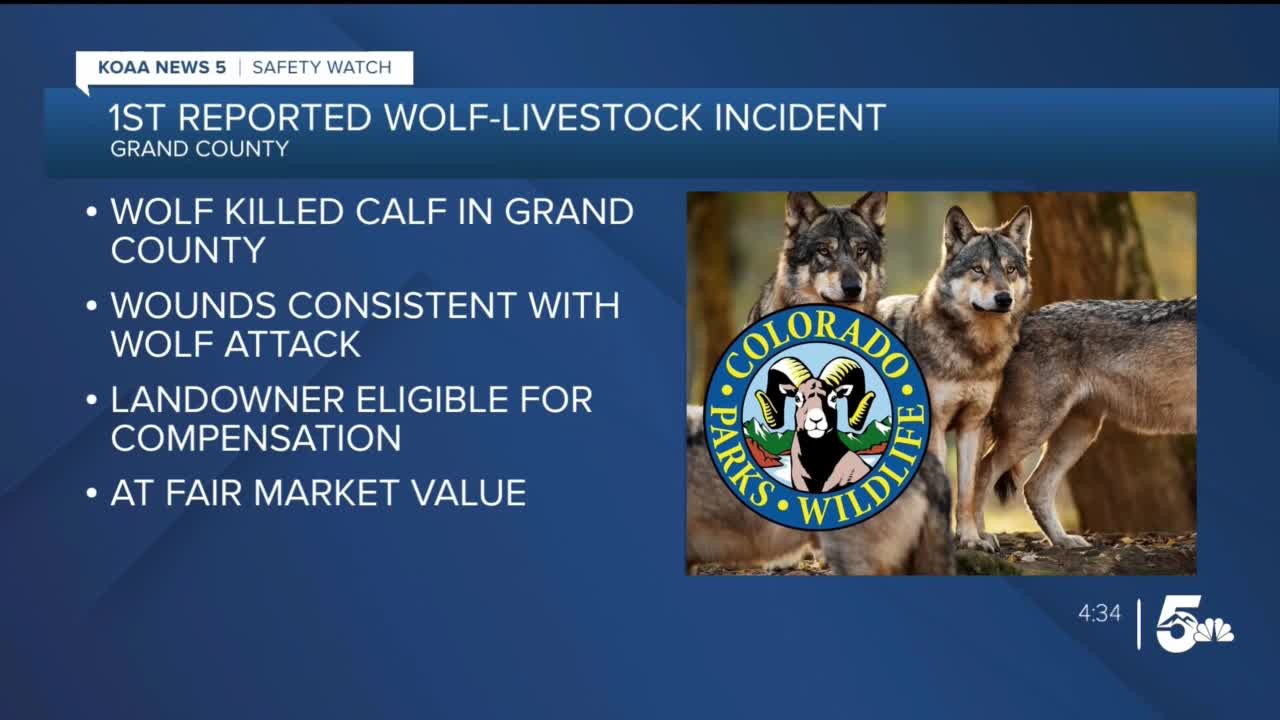GRAND COUNTY, Colo. — Colorado wildlife officials have confirmed the first wolf depredation on livestock since the reintroduction began in December, Colorado Parks and Wildlife (CPW) said Wednesday afternoon.
A landowner in Grand County reported finding a dead calf on the morning of April 2, CPW said. Per protocol outlined in the Colorado Wolf Restoration and Management Plan, wildlife officials began conducting a field investigation in the area, said Travis Duncan with CPW. They will do this "in the same thorough and professional manner the agency has been investigating black bear or mountain lion damage to livestock," the plan reads. Those wildlife officers later confirmed the depredation on Wednesday afternoon.
"The results of this investigation indicated wounds consistent with wolf depredation,” said CPW Area Wildlife Manager Jeromy Huntington. “The field investigation found multiple tooth rake marks on the calf's hindquarters and neck, and hemorrhaging under the hide, consistent with wolf depredation. Wolf tracks were also found nearby."
In line with the Colorado Wolf Restoration and Management Plan, the livestock producer — who has not been identified — is eligible for fair market value of the compensation if they submit a claim, CPW said.
"CPW staff will continue contacting producers in the area, and encouraging the use of appropriate non-lethal deterrents available through the agency," CPW said.
No other details were immediately available on this case as of Wednesday morning. This was first reported by Steamboat Radio.

Denver7 360 | In-Depth News
Grand County residents brace as gray wolf reintroduction process begins
Reid DeWalt, CPW’s assistant director of aquatic, terrestrial, and natural resources, reported at the May 13 CPW Commission meeting that no depredations had been reported as of that morning. This newly reported depredation is the first reported attack in Colorado since 10 gray wolves were taken from Oregon and released in Colorado in December, CPW confirmed.
However, over the years, there have been multiple conflicts involving the wolves that naturally moved into Colorado, including but not limited to:
- In December 2021, officials confirmed the first wolf kill of livestock in Colorado in more than 70 years
- In January 2022, CPW reported that a domestic dog had been killed — and another was injured — by wolves in Jackson County. This same month, two domestic cows were attacked by wolves in the same county
- In October 2022, CPW investigated potential wolf attacks on livestock near Meeker, but said it found no evidence of wolves in the area
For background: As part of the state's voter-mandated reintroduction effort, CPW released its first five gray wolves on Dec. 18, 2023 at an undisclosed place in Grand County. Our partners at Denver7 reported that five more were released a few days later in Grand and Summit counties. All 10 were collared, though CPW said on March 27 that a collar on a released gray wolf is no longer providing a signal and another collar is partially functioning and may fail soon. CPW did not have an exact reason for the failures, Duncan said. Re-collaring the wolves with new equipment could pose "an unnecessary risk to any potential reproduction," he added. So CPW will not try to fit those two wolves with new collars.
The state secured an additional 15 wolves from tribal lands in northeastern Washington to reintroduce next winter. This is all in the wake of the May 2023 approval of the Colorado Wolf Restoration and Management Plan.
That plan describes the legal requirement to provide fair compensation to livestock owners for any economic losses if their animals are injured or killed by wolves. If livestock or a guard animal is injured or killed, the wolf-livestock compensation program will pay for 100% of fair market value compensation, up to $15,000 per animal. A detailed layout of the compensation options is outlined on page 33 of the management plan here.

There is no compensation program for loss of pets or hunting dogs. Lethal control of wolves in the act of killing a pet or hunting dog, or just after the fact, is not allowed, as consistent with other game damage laws and regulations, according to the plan. In addition, under current state law, it is illegal to hunt wolves.
CPW has hired a wolf conflict coordinator to serve as the statewide expert on human-wolf conflicts, the plan reads.
During the most recent CPW Commission meeting, DeWalt said CPW will continue to set up supply houses — also called stash houses — which hold wolf depredation prevention materials that can be easily provided to producers if wolf conflicts arise, DeWalt said. As of that meeting, four were already in place and four more were planned. In addition, CPW has the ability to provide temporary conflict minimization materials to livestock owners on a case-by-case basis. This includes turbo fladry (electrified fencing with flagging) and scare devices, like shell-crackers, propane cannons, and foxlights, the management plan reads.

Local
CPW updates on wolf reproduction, conflict minimization, community outreach
At the end of March, CPW released an updated map to show how the gray wolves have traveled in the past month. Below is a map from late February on the left, and the most updated map on the right.

Looking ahead, CPW will continue with the operation according to the Colorado Wolf Restoration and Management Plan, which calls for the transfer of 30 to 50 wolves to Colorado over a period of three to five years, aiming for 10 to 15 wolves from multiple packs each year.
After that point, the reintroduction efforts will stop and CPW will monitor if the population is self-sustaining.
If you see a gray wolf, CPW asks that you fill out its wolf sighting form here. If possible, wildlife officers ask that you take photos and videos.






